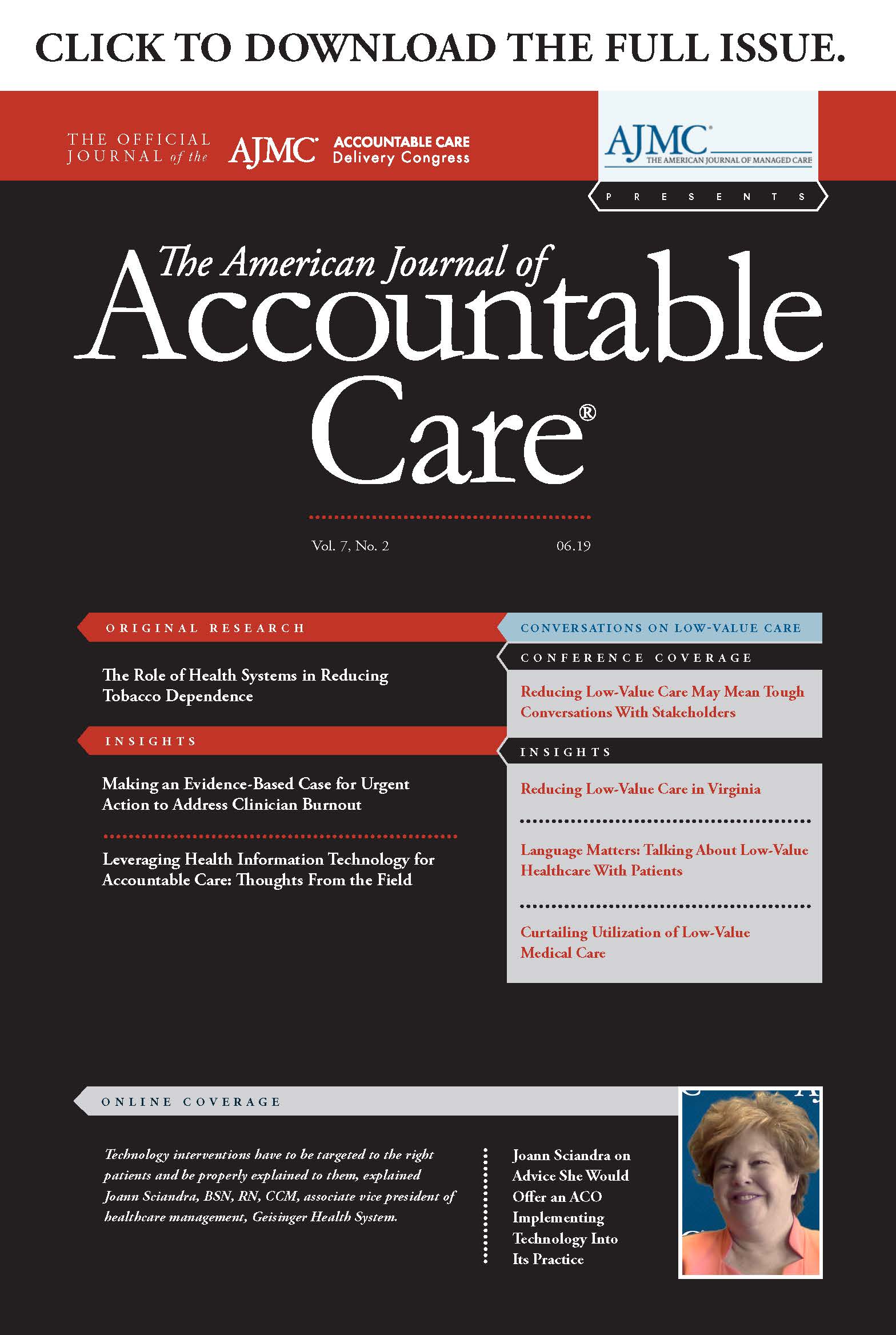- Center on Health Equity & Access
- Clinical
- Health Care Cost
- Health Care Delivery
- Insurance
- Policy
- Technology
- Value-Based Care
Editor’s Letter: Dennis P. Scanlon, PhD
AS THE NEW EDITOR-IN-CHIEF of The American Journal of Accountable Care® (AJAC), I’m particularly excited about the June 2019 issue because the content is an excellent representation of how we see AJAC’s niche going forward. Specifically, the goal is to straddle the space where implementation science, health services research, and applied management and systems science meet. This is a lot of space to cover, but it is incredibly important if healthcare in the United States is to achieve greater value for resources expended.
While partnerships between scientists and practitioners have led to improve­ments in care delivery, the business of evidence creation has been dominated by academics and health scientists, often with little input from consumer advocates, industry representatives, and care providers. Likewise, innovations occurring in industry are often considered proprietary in a health system with significant profit motives. The result is that lessons on implementing scientific evidence are not disseminated enough, nor are innovative ideas studied with the level of rigor needed to influence policy, payment, and clinical training.
The vision is for AJAC to provide a space for scientists and those involved in all facets of care delivery to interact and to communicate with those who set policy, regulations, and payment. AJAC will adhere to the principles of trans­parency and scientific rigor, but it will also embrace the uncertainty that comes with applying science in real-world settings, publishing results from explor­atory or pilot studies and informed commentaries from leaders in the field.
The June issue illustrates the value of AJAC:
- Low-value care is discussed from the perspectives of a patient advocate, a health plan, and a state policy maker. They highlight the success possible when such care is targeted and eliminated, as well as the delicate balance of communicating to patients the costs and benefits of treatment options.
- Yunfeng Shi, PhD, and coauthors reflect on the success and limitations of the push to implement and use the capabilities of electronic health records and health information technology. Despite progress, there is more work to be done to achieve better care. The article highlights some of the political, economic, and market barriers that impede achieving that potential.
- Two articles report on important topics from the field, including an article by Megan N. Whittet, MPH, and coauthors that focuses on health systems changes to address tobacco dependence; and an article by Bernadette Mazurek Melnyk, PhD, APRN-CNP, that focuses on clinician burnout.
I hope you find the content in the June issue of AJAC useful in your work, and I encourage you to think about contributing your own content for future issues. We are quite willing to work with potential authors, many of whom may not have experience with publication, to help frame and develop their work to meet the publication and scientific standards of AJAC.
Dennis P. Scanlon, PhD
Editor-in-Chief

Quality of Life: The Pending Outcome in Idiopathic Pulmonary Fibrosis
February 6th 2026Because evidence gaps in idiopathic pulmonary fibrosis research hinder demonstration of antifibrotic therapies’ impact on patient quality of life (QOL), integrating validated health-related QOL measures into trials is urgently needed.
Read More
Building Trust: Public Priorities for Health Care AI Labeling
January 27th 2026A Michigan-based deliberative study found strong public support for patient-informed artificial intelligence (AI) labeling in health care, emphasizing transparency, privacy, equity, and safety to build trust.
Read More
Ambient AI Tool Adoption in US Hospitals and Associated Factors
January 27th 2026Nearly two-thirds of hospitals using Epic have adopted ambient artificial intelligence (AI), with higher uptake among larger, not-for-profit hospitals and those with higher workload and stronger financial performance.
Read More
Motivating and Enabling Factors Supporting Targeted Improvements to Hospital-SNF Transitions
January 26th 2026Skilled nursing facilities (SNFs) with a high volume of referred patients with Alzheimer disease and related dementias may work harder to manage care transitions with less availability of resources that enable high-quality handoffs.
Read More

